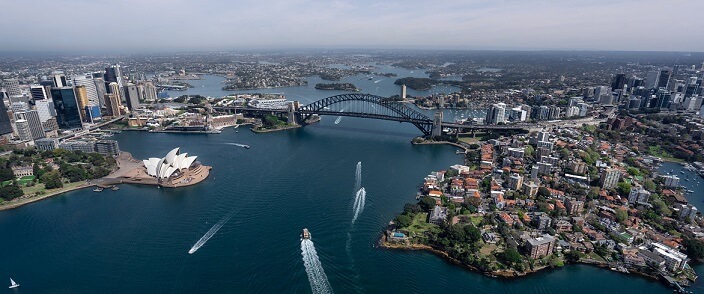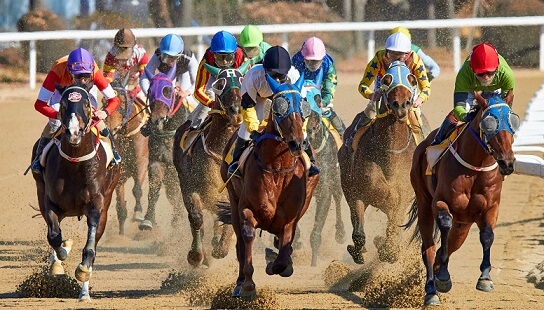The History and Future of Gambling in Australia

Gambling in Australia has a long history dating back centuries to somewhere in the 1700s. Horse racing events started in New South Wales in 1810, and by the 1850s, every major Aussie city had introduced turf clubs.
Nowadays, nearly 70% of the adult population gambles from pokies, poker, sports betting and even frog jumping. Australians spend, on average, about AU$198 billion a year, with the majority on lottery, casino and poker making up approximately AU$171 billion and the other AU$26 billion on sports betting wagering.
Our article will briefly examine the history of gambling Down Under, its roots, and how we expect it to evolve. We will look at the first forms of gambling to gambling today and how real-money Australian online casinos have developed.
Indigenous Gambling Practices
Putting an exact date on gambling in Australia is impossible. With its many entry ports, the early accounts of indigenous gambling are rather sketchy. One theory is that the British colonists introduced it in the 18th century. Indigenous groups would gamble over clothing, carcasses and valuable items of the times.
Other theories are that the first form of gambling in the 18th century was when European settlers found their way to Australia. They introduced a coin-based game known as Two Up. It originated in Greece but was also popular in the UK and Ireland. How it worked was the coins were tossed up. The bet was placed on how they landed. The most significant payout was landing two odds pairs, which was massive during the Great Gold Rush.
However, the impact on traditional gambling in indigenous cultures was significantly changed with the colonisation of Europeans. The colonisers’ primary aim of commercial gambling was to exploit the locals and take their wealth with gambling games. The result was widespread addiction, social problems, and a loss of traditional cultural practices.
European colonisers also stamped out or banned the traditional gambling practices of indigenous peoples. They claimed to do so in the name of morality and safeguarding indigenous well-being. However, it also worked to erode the rich tapestry of indigenous gambling cultures and traditions. The impact is still felt today. Many communities are attempting to revive their traditional gambling practices due to the negative consequences of commercial gambling.
Early European Influence
European settlers introduced a more sophisticated and regulated form of gambling in Australia that resembled European-style gambling establishments. One of the primary reasons for the rise of gambling was due to both spare time and the wealth of the colonials. When the first racecourse and legal casinos, known as gaming saloons, were introduced, they quickly became popular social hubs for the upper classes.
However, the rise of gambling opportunities has had a significant social impact on both the indigenous Australians and the colonial settlers. The excitement of gambling premises brought with it both positive and negative effects. On the one hand, it brought people together from different backgrounds, fostering a sense of community and social interaction. Due to the increase in alcohol abuse and social problems related to gambling, it also brought its negatives.
Due to these gambling establishments not having regulations, it caused excessive gambling, which resulted in more frequent criminal activities. This included theft, violence and prostitution, which posed a significant threat to public order.
Australian states and territories began introducing regulations. In 1930, betting was legalised at racecourses with licensed and private bookmakers. In 1961, Victoria was the first state to open the Victorian Totalisator Agency Board, which was privatised in 1994. The other states quickly followed and introduced various TABs (Totalisator Agency Boards).
Despite its rocky start, the advent of European gambling in Australia in the 19th century helped shape Australia’s culture and social landscape. It remains an essential part of Australian culture today and attracts millions of yearly visitors.
Rise of Horse Racing

As we have already discussed, horse racing has a fascinating background story that intertwines with Australia’s colonial history. It all started when European settlers brought their love and passion for horse racing to Australia. While initially it was primarily aimed at the rich and elite, it quickly gained popularity amongst all social classes.
Several factors fueled the growth of horse racing in Australia. Firstly, we have massive open spaces and a climate that provides ideal conditions for racing, training and breeding thoroughbreds. The sport also offered gambling and betting opportunities, increasing its appeal.
The officers of the 73rd Regiment from Governor Macquarie set up the first horseracing meeting. It was held at Hyde Park in Sydney in October 1810 on Monday the 15th, Wednesday the 17th and Friday the 19th. The timeline for further clubs launching went as follows:
- In Victoria, the first race in Batman’s Hill in Melbourne was held in 1838. In 1864, the VRC (Victorian Racing Club) was born.
- The first race meet in Queensland was in 1843 at the Queensland Turf Club in 1863. The Brisbane Amateur Turf Club was launched in 1923.
- Adelaide had its first meeting in 1843. The South Australian Jockey Club followed in 1856.
- Tasmania had its first meet in 1814 at Newton. The Tasmanian Turf Club (TTC) was founded in 1871 as a significant player.
- The Darwin Turf Club opened in 1955.
It was estimated that 192 country clubs were registered to race under the rules of the Australian Jockey Club by 1883. Nowadays, you can gamble on Australian horse racing and international events due to the ease of online betting.
Horse Racing betting systems history
The first system introduced was the Totalisator System, commonly known as the tote and changed the way bets were placed. It provided a central system for betting and was established in 1913 in New Zealand. By the middle of the 1930s, it entered Australia, UK and the USA.
The tote system then evolved into pari-mutuel betting. This is where all bets get pooled together, and the odds are determined by the amount wagered on each horse. It is still widely used in Australia.
Over time and with the growth of the internet, professional tipsters started gaining notoriety. They analyse data from horse races and will provide tips and predictions to help bettors increase their winning chances.
Horse racing has been a cornerstone in shaping Australian society. It has a way of bringing people together across many backgrounds. It helps to create a sense of community and national pride. Today, it remains a massive pastime and a thriving industry, hosting globally renowned events like the Melbourne Cup.
Lotteries and Other Forms of Wagering
The lottery was first introduced in the 1880s but prohibited in New South Wales. Later on, it surged in Queensland, Victoria, and Tasmania. During World War I, the Australian government launched the first official lottery, the Golden Casket. It aimed to collect money for various community and charity projects.
The first draw took place in 1916 in Queensland, and its purpose was to raise funds for the war veterans returning from Europe. In 2007, it became part of the Tatts Group.
Over the following decades, more laws and lotteries were introduced, which were also set up to help schools, government projects, and hospitals so that they could collect necessary funds.
In Australia today, there are numerous state-owned, non-profit and private-sector lottery schemes like Tatts Lotto, Oz Lotto, Powerball, Keno, Set for Life, Monday and Wednesday Lotto, Soccer Pools, and the Mega and Super Jackpots.
Horse racing betting was the only legal sports betting until 1984. The TAB started taking sports bets, but non-government bookmakers only appeared in 1994. The first Australian sportsbook launched in 1996, Centrebet.com.au. It was initially known as Sportsbet.com.au. In 2010, the British betting site Paddy Power took over operations, and since 2016, it has been under Flutter Entertainment plc. ownership.
Today, many online sportsbook operators will take bets on horse racing and a mix of sports like football, cricket, golf and even obscure bets like who the next Prime Minister will be.
Casinos and Gambling Expansion
The first pokie surfaced in 1953 in Australia when a Syndey-based Australian company, Aristocrat, noticed its success in the USA and brought it to Australia. Aristocrat is still a significant player in the iGaming industry and developing pokies today. Its first pokie was Clubman, replaced with Clubmaster in 1955
In 1956, gaming machines were legalised in pubs and registered clubs. Other states were not far behind, and they quickly became a massive hit with Aussies. Over the following decades, pokies expanded to include more paylines. Although there were jackpots, they were insignificant compared to what’s offered today, with millions available on some jackpot pokies.
The first legal land casino was the Wrest Point Hotel Casino, which opened in Hobart, Tasmania 1973. Other states swiftly followed suit to help improve tourism and boost the economy. Fast forward to the mid-1980s, and the first video slots entered pubs and online casinos with five reels, more paylines, free spins and other fun gambling options. Poker machines were launched in several Australian states in the 1990s.
Today, there are hundreds of thousands of land-based pokie machines, with more than half in New South Wales. Australia also ranks seventh in the world for the number of pokies behind countries like Japan, USA and Germany.
The industry continues to grow, and iconic sites like the Crown Casino in Melbourne and The Star in Sydney have become major entertainment complexes. They don’t only offer gambling but luxurious hotels with restaurants and entertainment. Casinos continue to attract international and local tourists with a perfect combination of facilities appealing to diverse visitors.
As legal casinos have been introduced in Australia, the industry has grown significantly, positively affecting tourism. However, issues such as regulatory complexity, online competition, and social concerns like problem gambling challenge its continued growth.
Technological Advancements and Online Gambling in Australia

One of the primary reasons for the high-speed growth in online gambling in Australia is the widespread availability of the Internet. Mobile casinos have also revolutionised the way we gamble, and we don’t have to wait to get home to have a spin on a pokie. We can play wherever and whenever we want. Gambling on the go is the new norm and has taken over from desktop gambling.
Another factor driving the gambling upswing is advanced security features and secure payment options. The rise in digital wallets, crypto payments and encryption technology ensures seamless transactions without the fear of data compromise.
Online casinos have also advanced massively since the days of pub pokies. Hundreds of software developers are crafting different themes, high-quality graphics and immersive sounds. Live dealer games have HD quality and multiple camera angles. It means players, although the primary reason is to gamble, will also play for the fun aspect.
The popularity, though, is not only down to technology advancements. With so much competition, each casino operator will strive to stand out. They do that with thousands of games, and with no floor space required, they can offer an unlimited number. You can also find betting sites offering a one-stop option with casino gaming, virtual sports, sports betting, and a one-wallet system.
As gambling continues to grow, so do the regulatory frameworks. Casino operators must adapt and evolve as new challenges or opportunities arise. The main aim is to balance the industry’s growth, fair play and player protection.
Social and Economic Impacts of Gambling in Australia
So, where does gambling in Australia leave the country in terms of social and economic impact? While there are some benefits, there are also some negatives, as follows:
- Problem Gambling and Addiction: With an increase in the availability of gambling options, so does the number of problem gamblers. It can cause the gambler and their families financial worries and strained relationships.
- Community Well-being: Where there is an increase in gambling, it can lead to social issues like higher crime rates. This is due to illegal activities so that an addicted gambler can fund the habit.
- Mental Health: For those who have a problem gambling, it can cause mental health worries, which can take their toll, especially for those who are facing financial loss due to their gambling.
The benefits for the country are:
- Revenue: The gambling business creates employment opportunities and generates substantial economic revenue.
- Tourism: Gambling establishments are social hubs that attract tourists, contributing to the economy. Significant events like horse racing or poker tournaments can attract many international visitors.
- Tax Revenue: The Australian government receives taxes from gambling, which it uses to fund public services and infrastructure.
- Job Creation: There are many jobs in gambling establishments, from croupiers to chefs, entertainers, etc., positively impacting local communities.
It is a delicate balance for governments to manage the positive influences versus any negatives by introducing measures to counteract problem gambling. They do this with various regulations and implement responsible gambling practices.
Responsible Gambling Measures
The regulators and online casinos have an essential role in controlling problem gambling. The Australasian Gambling Council defines problem gambling as “Responsible gambling refers to policies and practices designed to prevent and reduce potential harms associated with gambling; these policies and practices often incorporate a diverse range of interventions designed to promote consumer protection, community/consumer awareness and education, and access to efficacious treatment.”
Regulators and casinos incorporate tools for players when gambling online. Managing land-based is much more challenging as players can move on to the next venue if banned at another. Some measures you will find when gambling online are:
Deposit Limits
You can set daily, weekly or monthly limits. You are in control, and if you hit any limit, you can’t deposit until the new period begins.
Loss Limits
You can also set these over a set period. It is only your net losses over that period, so if you had a win, it is taken into the equations.
Time Limits
A time limit is for those who get caught up gambling and completely lose track of time. You can set your limits and automatically log out when you’ve reached it. Many online sites also have a clock showing you your time online, pop-ups letting you know you have been gambling for an hour, etc.
Self-Assessment Tests
Self-assessment tests are a way to answer a set of questions and understand whether or not you have a problem with gambling. You must rate a series of questions on a scale of 1 to 10. You will receive a detailed breakdown of how it impacts you and recommendations for the next steps.
Temporary Time-Outs
A time-out is when you decide you want a temporary break from gambling. You choose your period, which starts at 24 hours, a week or even a month. You won’t be able to access your gambling account when these restrictions are in place.
Self-Exclusion Programs
A self-exclusion program in Australia is BetStop, a national website. You can set limits from a minimum of three months to a lifetime ban. You can extend the period. However, you cannot reduce it, and you won’t be able to make changes for the first three months. It excludes you from approximately 150 licensed Australian betting operators. Offshore operators will have their own ways of setting a self-exclusion period and aren’t included.
Conclusion
Gambling in Australia is a favourite pastime of many. It has brought many benefits to our shores with luxurious resorts and incredible horse racing tracks. The economy gets a boost, creating more job opportunities and tax revenue that the government uses to improve local services.
Knowing where to play safely is a vital consideration for players, as gambling online can come with risks. That’s where we come in. We have reviewed and tested the top gambling sites in Australia, from those offering only casino action to those also offering sports betting.
Whether you want to play at new online casinos or those that are best for mobile gaming, we’ve got some excellent options. Click here to select a reputable and reliable new Australian gambling destination.






